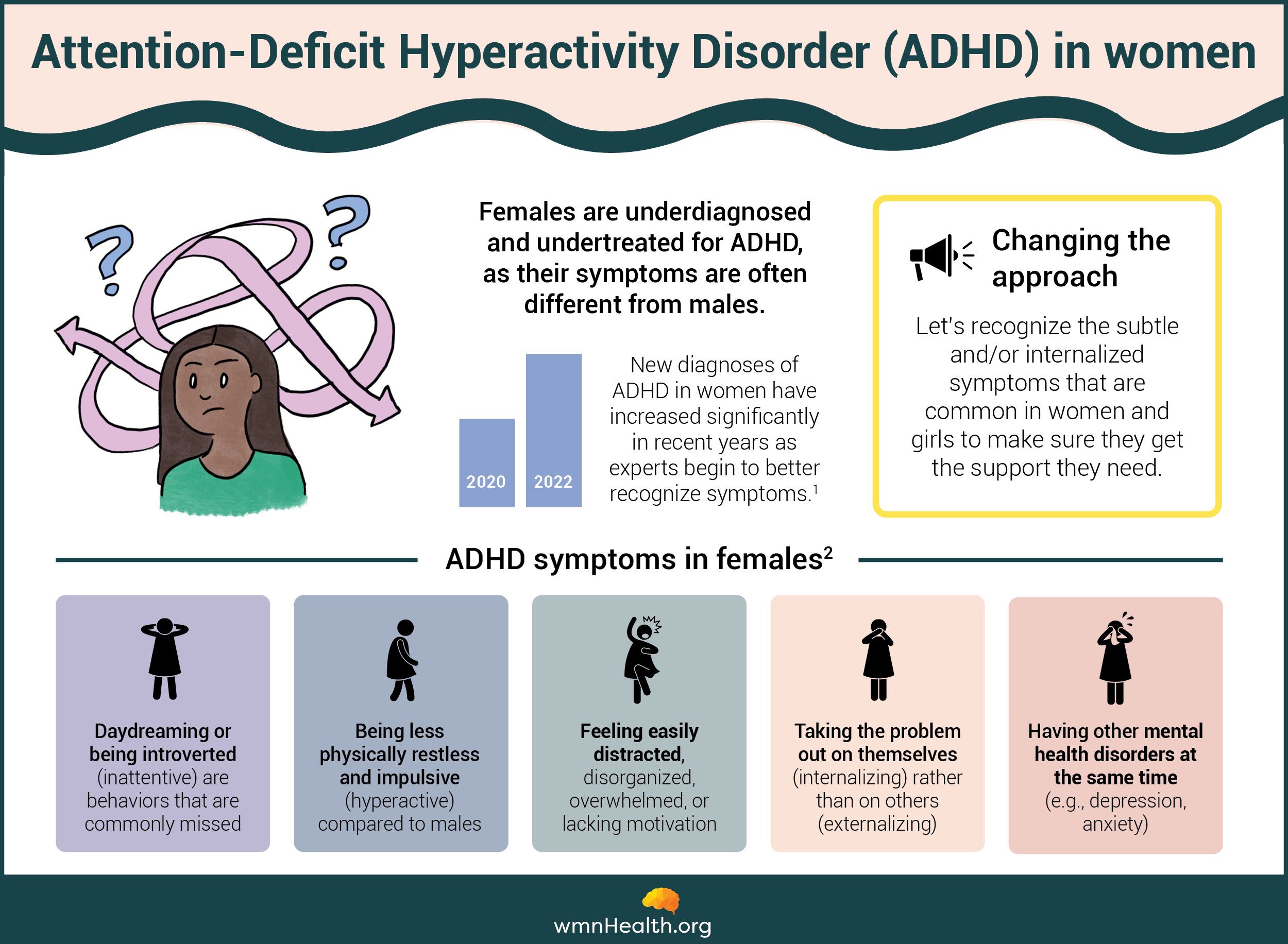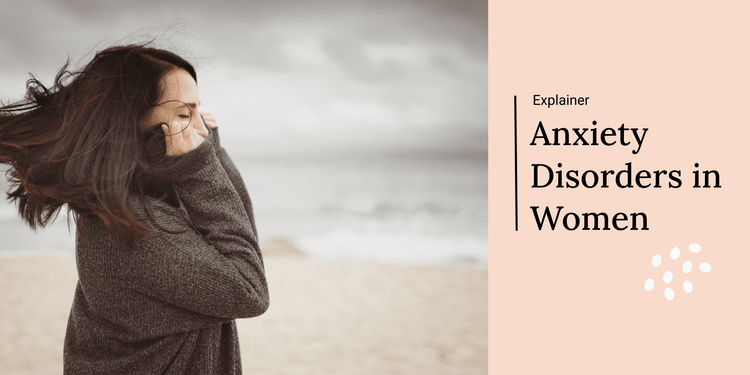
Nov 01, 2023, 4:00 am UTC
3 min
Created by
Cases of ADHD in women are rocketing. What's behind the trend?
Attention-deficit/hyperactivity disorder (ADHD) is one of the most common childhood neurodevelopmental conditions, and it's having a moment.
Whether it's due to the growing number of ADHD influencers on TikTok—the #adhd hashtag has more than 30 billion views—or the pandemic's unmasking of ADHD symptoms that have led many adults to seek a professional evaluation, the recent explosion in diagnoses is a striking new trend, especially for women.
Attention-deficit/hyperactivity disorder is a chronic and debilitating mental disorder that is known to impact the individual in many aspects of their life, from academic and professional achievements and interpersonal relationships to daily functioning. Adults with ADHD typically experience poor self-worth, sensitivity toward criticism, and increased self-criticism.
Source: American Psychiatric Association
Girls and women with ADHD have been slipping under the radar since doctors first started studying, diagnosing, and treating the condition. In fact, studies show as many as half of women with ADHD are routinely misdiagnosed with other behavioral and mental health conditions, such as borderline personality disorder (BPD), anxiety, and bipolar disorder.
But, in the post-pandemic world, the ADHD landscape is slowly shifting: The percentage of women between the ages of 23 and 49 who've been newly diagnosed with the condition has nearly doubled from 2020 to 2022. That rise may look like a cause for celebration. But getting a diagnosis — and effective treatment — early in life remains an uphill battle for many.
Explore the reasons behind the gender gap in ADHD diagnosis and treatment, learn how the condition manifests in women, and get the resources you need for living — and thriving — with ADHD.
Common signs & symptoms of ADHD
- Difficulty paying close attention to details and staying focused
- Inability to stay organized and complete tasks
- Frequently losing or forgetting things
- Difficulty following through on instructions
- Restlessness and inability to remain seated for long periods
- Procrastination
- Brain fog
Source: Mayo Clinic
Risk factors for ADHD
- Genetics: Close relatives, such as a parent or a sibling, with ADHD or another mental health condition
- Poor nutrition before birth: Exposure to drugs and alcohol in the womb
- Birth complications: Being born prematurely
- Environmental toxins after birth: Childhood exposure to chemicals like lead and mercury that affect brain development
- Traumatic brain injury: Sustaining a severe head injury as a child or teenager
- Simultaneous mental health conditions: Experienced behavioral and mental health challenges like depression, anxiety disorders, and personality disorders during your lifetime
Source: CDC
ADHD and the brain
Understanding the neurobiology of ADHD is essential for diagnosing and treating it. Like many other brain conditions, such as depression, anxiety, and even Alzheimer's, a deficiency in neurotransmitters — brain chemicals that act like messengers of the nervous system and help transmit information between neurons and to muscles — underlies ADHD.
Norepinephrine, the specific neurotransmitter that is deficient in the brain of individuals with ADHD, is known to play an essential role in attention, alertness, and concentration. Experts believe an imbalance in norepinephrine levels leads to many of the symptoms of ADHD in women, such as inattention and impulsivity.
But there are other notable differences in the brain, which contribute to its most common signs and symptoms.
Studies have shown structural changes in these areas of the brain are linked with ADHD:
Basal ganglia: It is involved in memory, learning, and planning
The prefrontal cortex: This part of the brain is vital for regulating attention, behavior, and emotions
The limbic regions (amygdala, hippocampus, hypothalamus): These areas influence motivation and decision-making
Inside ADHD: What ADHD looks like in women
Historically, research on ADHD has almost exclusively focused on how the condition manifests in boys: hyperactivity, impulsive behaviour, and chronic restlessness. However, girls and women with ADHD experience a different set of symptoms that defy the "traditional" understanding of ADHD. These symptoms include distractibility, forgetfulness, poor memory, and procrastination.
Girls with ADHD remain an enigma — often overlooked, misunderstood and hotly debated. —Ellen Littman, PhD
For these reasons, "girls with ADHD remain an enigma — often overlooked, misunderstood and hotly debated," according to clinical psychologist Ellen Littman, one of the first experts to focus on gender differences in ADHD.
 Infographic by Cat Lau. (References below.)
Infographic by Cat Lau. (References below.)A New Direction: Where the science and understanding of ADHD is moving
In 2022, a longitudinal study focused on girls and women with ADHD found a higher risk of self-harm, mental health challenges, partner violence, and unplanned pregnancies among women with ADHD, underscoring the need for diagnosing and supporting them.
This study, coupled with the post-pandemic rise in ADHD diagnoses among women, has improved awareness around the condition, and countless women have come forward on social media with their experiences of living with ADHD.
Researchers, on the other hand, are also dedicating more resources to studying ADHD in girls and women. Duke University in North Carolina, for example, has also opened the first U.S. program focused on advancing knowledge about ADHD in women and girls and its impacts on family members, clinicians, educators, and the broader public.
If you or a loved one suspects they have ADHD, here is a list of credible resources that will help you in your journey to understand and accept ADHD:
Infographic References
- Cosmos Study: Number of ADHD Patients Rising, Especially Among Women, Epic Research. March 30, 2023.
- Young S, Adamo N, Ásgeirsdóttir BB, Branney P, Beckett M, Colley W, Cubbin S, Deeley Q, Farrag E, Gudjonsson G, Hill P, Hollingdale J, Kilic O, Lloyd T, Mason P, Paliokosta E, Perecherla S, Sedgwick J, Skirrow C, Tierney K, van Rensburg K, Woodhouse E. Females with ADHD: An expert consensus statement taking a lifespan approach providing guidance for the identification and treatment of attention-deficit/ hyperactivity disorder in girls and women. BMC Psychiatry. 2020 Aug 12;20(1):404. doi: 10.1186/s12888-020-02707-9.



